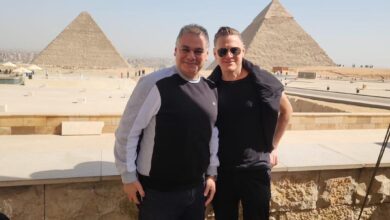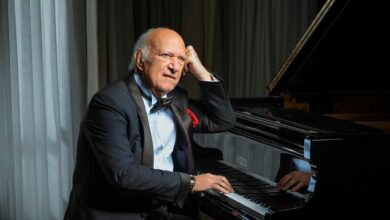Shiekh Gomaa el-Bana’s voice rang out Wednesday night, bouncing off the stone walls and casting a spell over the packed house gathered at the Egyptian Center for Culture and Art—commonly known as Makan.
The event was Zikr, an occasional change-of-pace show hosted at Makan as an alternative to their normalNass Makan (The People of Makan) performances. The Nass Makan events tend to feature larger bands, more boisterous music and a distinct Nubian/Sudanese vibe. In contrast, the Zikr was pure country Egyptian, a stripped down and less chaotic version of what you can find at the dozens of Sufi moulid festivals that dot the country.
El-Bana performed in front of a small five-piece band, including oud, reeds, violin and percussion, but the musicians kept their tone fairly low-key—allowing his voice to serve as the sixth and primary instrument.
That voice–combined with a veteran storyteller’s art for drawing in his audience—created an infectious and hypnotic mood. The slightest up-tempo shift by the band was enough to get the audience clapping.
El-Bana’s lyrics followed the traditional Zikr pattern of finding clever and innovative ways of praising God. These took the form of extended stories or lyrics that often sounded like love songs but were in fact expressing a love of the Almighty.
“You are my life,” el-Bana sang. “There’s no one but you.”
It’s indicative of the Makan ethos that the center’s director Ahmed el-Maghraby deliberately avoids calling his events “shows” or “concerts.” That’s apparently too one-way for the experience he envisions. Instead el-Maghraby calls his events sahras (evenings) and it’s no accident that the Makan space has no stage—placing the performers on the literally the same level as the audience.
“It’s not a concert,” el-Maghraby said. “It’s an evening with people spending time together.”
El-Maghraby has created a deliberately intimate space; old radios and record players litter the shelves along with old books. It all creates the impression that you’re sitting in a rural home salon listening to a private performance.
But that intimacy comes with risks. At a place like Makan, the performers are so close to the audience that the moods can literally overlap. If a musician or a singer was simply going through the motions that night, it would show immediately and definitely influence the crowd’s mood.
The positive side of that dynamic is that Makan makes it easy for talented, enthusiastic performers like el-Bana to take his audience (or as el-Maghraby would put it, his companions in the Sahra) along for an infectious and enjoyable two-hour journey to the heart of the Zikr.




